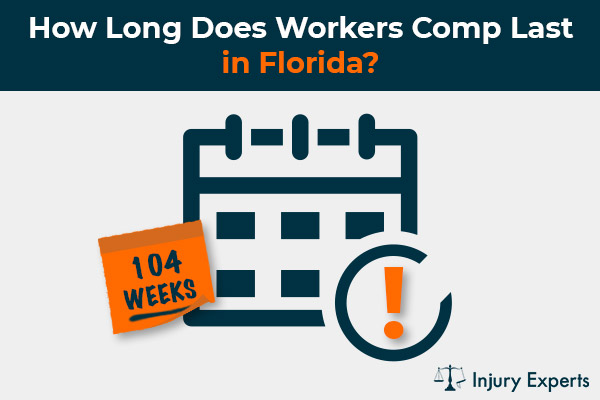How Long Does Workers Comp Last in Florida?
Snapshot
Knowing how long workers compensation benefits last helps Florida workers injured at work make plans. Even though state statutes are clear regarding their intent, circumstances surrounding each injured employee’s situation provide plenty of gray area.
How long workers compensation benefits last in Florida seems a reasonably straightforward question. After all, everything about the operation of workers compensation in Florida is meticulously covered in state statutes. (It’s Chapter 440 if you fancy a bit of light reading.)
Not so fast.
The fact that workers comp rules have been codified does not mean every eventuality or nuance has been accounted for. Just as life events resist structure, so workers comp claims often get fuzzy in the details. Like milk spilled on a hardwood floor, novel workplace circumstances seek cracks to fall through.
And even though workers comp is designed to make life easier for employees and employers after a workplace mishap, real dollars are involved in how events play out. In 2021 alone, insurers paid out $1.384 billion in Florida workers comp claims.
Of that total, indemnity payments — payments for lost wages in Florida — reached nearly $294 million. Below, we’ll discuss temporary and permanent disability benefits, the classifications that allow injured workers to recover part of their wages lost as a result of a work-related injury, condition, or illness.
Know this as we dive in: Insurers have an interest in legally limiting how much they pay out. Having a workers compensation attorney to help balance the scales of legal nuance on your behalf is never a bad idea.
“I recommend having an attorney from the beginning,” says Sarah Raaymakers, a partner in the Tampa Bay area firm of Philips & Raaymakers. “It just makes the process easier. … Having somebody to call before things get bad or before things get difficult, or before you’re under a time crunch is so much better.”
How Long Do Temporary Benefits Last in Florida?
This seemingly straightforward inquiry is, in fact, a trick question. How long temporary benefits last in Florida depends on the long-term condition of the injured worker.
Temporary benefits may last 104 weeks. But they can stop well short of that if, in the judgment of the worker’s doctor, maximum medical improvement (MMI) has been reached.
What’s MMI? It’s the point at which the attending physician determines there are no other treatments that will improve the injured worker’s condition. This may mean anything from great news — the worker is completely healed and good as new — to terrible news — the worker’s condition is not going to get any better, no matter what we give him.
To be absolutely clear, then: Temporary benefits in Florida last up to 104 weeks, or when the doctor declares the worker has reached MMI, whichever comes sooner.
Another way benefits can be terminated early: The worker fails to keep doctor’s appointments or neglects the doctor’s orders. Additionally, if the doctor clears the patient to return to work, but (s)he declines, temporary benefits may be stopped.
Workers should consult with their physicians if they’re concerned a return to the job will make the injury worse; the physician may need to amend your return-to-work provisions.
How Long Do Permanent Benefits Last in Florida?
Injured workers who meet the MMI classification but suffer some sort of permanent impairment may fall into one of two categories: Permanent partial disability (PPD) or permanent total disability (PTD). Again, the attending doctor makes the determination.
Permanent Partial Disability
Workers who suffer a permanent partial disability — they’ve lost function or have been impaired, but still can do wage-earning jobs — are assigned an impairment rating after they reach MMI. The rating determines how many weeks of benefits the worker can receive.
Workers with PPD may receive ongoing medical benefits to cover doctor’s visits and other pertinent care in addition to lost-wages benefits.
Permanent Total Disability
Workers declared to be permanently totally disabled — that is, they never can return to wage-earning work — may receive benefits until they reach the age of 75, or longer if they’re ineligible for Social Security disability benefits.
Additionally, PTD workers may qualify for supplemental benefits, paid weekly, until the age of 62.
Whether workers are being accurately assessed and fully and fairly compensated is a problem best reviewed by a an attorney experienced in workers compensation law.
How Long Do Medical Benefits Last in Florida?
Injured employees covered under workers comp receive medical benefits (for doctor’s visits, rehabilitation, medical equipment, prescriptions, and so on) as long as the need persists.
A key requirement to stay on track: Workers must be seen by an authorized physician at least once annually to provide evidence your condition is being actively managed.
Negotiating the details, requirements and ongoing payments of a lump-sum settlement is the fastest, sometimes best way to put a satisfying end to a worker’s claim for both the worker and the insurance company. Once a mutually agreeable total has been signed, sealed, and delivered, workers compensation benefits end.
We reiterate: Workers’ compensation law is a complicated thicket. Anyone who’s here looking for after-work-related-injury guidance should consider consulting an experienced attorney before making any decisions. If a settlement is under discussion, your case may be — probably is — worth far more than the insurance company is letting on.
Sources:
- N.A. (2022, June 1) Workers' Compensation Claims Statistics. Retrieved from https://dwcdataportal.fldfs.com/STATSSearch.aspx
- N.A. (ND) Injured Worker Frequently Asked Questions. Retrieved from https://www.myfloridacfo.com/division/wc/employee/faq.htm

